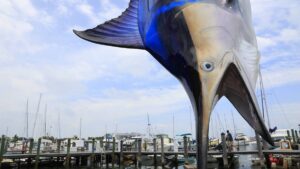9 of the most interesting biotech bosses in the game: part 2

Pic: Charnchai / iStock / Getty Images Plus via Getty Images
You don’t need a PhD to run a biotech, but sometimes it helps, as these companies deal in one of the most complicated mysteries still to be solved today: the human body.
Biotech CEOs and chairs tend to be the cross-over scientists. However, they’re the ones who understand the fiddly details of the science behind the tech yet can also communicate it to laymen and convince people to part with large sums of money to support it.
Stockhead is profiling nine biotech bosses who are either at the top of their game, leading fascinating little companies, or are steering damaged ships to port — a valuable skill when the rate of failure for new drug development is above 90 per cent.
These are the remaining four.
Memphasys (ASX:MEM) executive chair Allison Coutts
Memphasys was a mess when Allison Coutts arrived on the scene: the company, called NuSep Holdings until 2016, has struggled through several years plagued by money troubles, court cases, and an ASIC investigation.
“For the first time in four years I can say we have nothing and there is nothing on the horizon,” Coutts told Stockhead in mid-2018.
Against all odds the company survived.
Today its share price has been on a six month run, the ‘sperm sorter’ — a device that sorts bad sperm from good for both race horses and men — is set to start being sold next year to IVF clinics, and 2,000 devices are due to be delivered to the company as a first run this month.
Coutts is, by any measure, formidable.
She cofounded a financial advisory firm called eG Capital, respiratory drug developer Mariposa Healthcare, and Micro-X (ASX:MX1) which is developing a lightweight mobile x-ray machine.
Coutts, an 11 per cent shareholder, is one of the driving forces behind Memphasys. The other is fellow director and 23 per cent holder Andrew Goodall, an entrepreneur from New Zealand.
Coutts became involved with the company four years ago when she stepped into the role of executive chair.
“We fought to stay alive. I have had to put my own money in and re-mortgage the house,” Coutts told Stockhead this year.
“It was well worth saving because the technology is excellent.”
Opthea (ASX:OPT) CEO and managing director Dr Megan Baldwin
In many ways Opthea is Dr Megan Baldwin’s baby: she was part of the Ludwig Institute for Cancer Research in Melbourne scientific team that discovered the company’s drug candidate to treat vision deterioration.
Earlier this year Opthea became a $1 billion company, after phase 2 trials saw significant progress in treating some cases of age-related macular degeneration (AMD), an eye disease which can cause blindness, when its potential new drug is used jointly with a commonly used treatment.
Baldwin was part of the team that discovered what is now OPT-302, but she hasn’t always been associated with the company.
She spent five years with Roche subsidiary Genentech before coming back in 2008 to work in Circadian Technologies, the parent of Opthea when the broader company was still primarily focused on its cancer research subsidiary.
But it was 2014 when the company got serious about eyes: Baldwin, chief of the Opthea subsidiary, was named CEO of Circadian, the company began talking to the US FDA about trials, and it raised $17.4m to fund phase 1 and 2a trials for AMD.
It’s taken Baldwin six years to shepherd OPT-302 from clinical trial discussions to delivering the results of a phase 2b — which was so successful its shares more than doubled and sent the R&D biotech into the $1 billion stratosphere.
Baldwin has led a $50m capital raising for phase 3 trials, and analysts expect much, much more to come from the no-longer small cap.
Starpharma (ASX:SPL) CEO Dr Jackie Fairley
Dr Jackie Fairley has led Starpharma since 2006, as it wrangled with its lead drug.
Starpharma’s product was spun out of national researcher CSIRO in 2000 onto the ASX, and in that time has gone from concept, through clinical trials and is now being sold.
Under Fairley’s leadership, the company has not only put its drug VivaGel through clinical trials for bacterial vaginosis and as a barrier to HIV, herpes and human papillomavirus, but commercialised both.
Revenue however dipped in FY19, as signature milestone payments for commercialisation weren’t repeated.
The company is also still making a loss but that is due to a revival of Starpharma’s cancer portfolio.
It is taking a version of cancer drug Jevtana through phase 1 and 2 clinical trials, as a treatment for cancers including prostate, ovarian, cholangiocarcinoma and pancreatic.
Jevtana includes detergents in the formulation in order to combat neutropenia, a side effect where a person has a low level of neutrophils, the cells which help the body fight infection.
Virtus Health (ASX:VRT) CEO Sue Channon
Sue Channon has been at the top of IVF provider Virtus for seven years, but ends her tenure in February 2020.
The New Zealander has led Virtus through some tough years, from fending off cut-price IVF services and trying to win back market share at a time when, in 2016-17 at least, fewer women were trying to get pregnant.
Channon leaves the company with rising revenue, thanks to a European adventure that is paying off handsomely, but lower profits as continued restructuring in Australia — to keep up with the competition — bit into the FY19 results.
Virtus has struggled since cut-price operators entered the market about six years ago, offering women a less inclusive service but for a drastically lower fee.
Under Channon’s watch the company set up operations in countries like Ireland and Denmark, which are paying off and supporting the business strongly now, but aggressive competition is keeping it on its toes in Australia, requiring constant reassessment.
UNLOCK INSIGHTS
Discover the untold stories of emerging ASX stocks.
Daily news and expert analysis, it's free to subscribe.
By proceeding, you confirm you understand that we handle personal information in accordance with our Privacy Policy.








